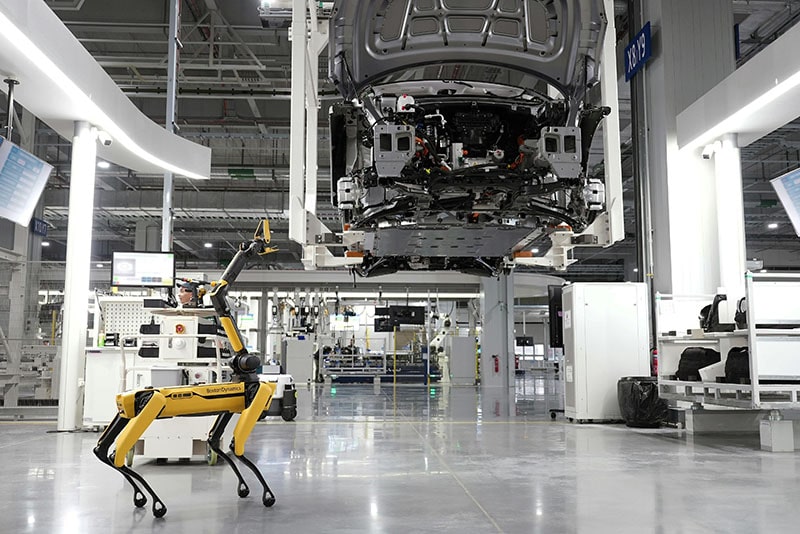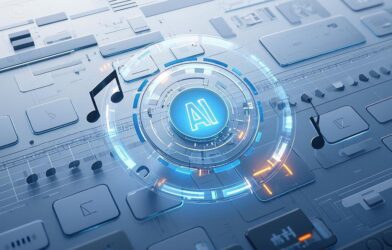Artificial Intelligence in the Automotive Industry: Driving Innovation and Transformation
Artificial Intelligence (AI) has become a game-changer in various industries, and the automotive sector is no exception. AI technologies are revolutionizing the way cars are designed, produced, and interacted with by consumers. From autonomous driving and predictive maintenance to manufacturing processes and customer experiences, AI is making vehicles smarter, safer, and more efficient. This fusion of AI and automotive technology is shaping a future where intelligent mobility systems are more connected and streamlined than ever before. Let’s explore how AI is transforming the automotive industry and what this means for the future of transportation.
Autonomous Driving and Smart Cars: The Future of Mobility
One of the most prominent applications of AI in the automotive industry is the development of autonomous vehicles. Self-driving cars, which were once a futuristic concept, are now becoming a reality thanks to AI-powered systems that can process and respond to complex real-time data from the environment. Companies like Tesla, Waymo, and GM’s Cruise are leading the charge in autonomous driving by utilizing advanced AI technologies, including machine learning algorithms, cameras, sensors, and LiDAR.
These AI systems enable vehicles to interpret traffic patterns, road signs, and other vehicles on the road, allowing them to make split-second decisions with incredible precision. The result is a safer and more convenient driving experience, as autonomous cars can navigate without human intervention, avoiding accidents, adjusting to traffic, and even parking themselves.
AI’s role in autonomous driving also enhances safety by reducing the risk of human error, which is a significant cause of road accidents. As the technology improves, the transition to fully autonomous vehicles seems increasingly inevitable, paving the way for a future where roads are populated by smart, self-driving cars.
Reference:
AI and Autonomous Driving in Tesla
Waymo’s Self-Driving Technology
Predictive Maintenance with AI: Preventing Breakdowns Before They Happen
Another key area where AI is making a difference in the automotive industry is predictive maintenance. Traditional vehicle maintenance often involves routine checks and diagnostics, which can sometimes overlook potential issues until they cause significant problems. However, with AI-powered diagnostic systems, this is changing.
AI tools analyze data from sensors embedded in the vehicle to predict potential issues before they occur. By monitoring factors like engine temperature, tire pressure, and brake performance, AI systems can forecast when a vehicle is likely to experience a breakdown or failure. These insights help vehicle owners and workshops identify problems early, reducing downtime and repair costs.
For example, BMW and Audi are already leveraging predictive maintenance technologies to enhance vehicle reliability. These systems notify owners and service centers of issues, allowing repairs to be made proactively rather than reactively. This not only saves time and money but also increases the overall reliability of the vehicle, making the driving experience more seamless and hassle-free.
Reference:
BMW’s Predictive Maintenance Solutions
Audi’s Smart Maintenance Systems
Revolutionizing Manufacturing Processes: AI in Automotive Production
AI is also revolutionizing the manufacturing side of the automotive industry. The traditional automotive production line has been significantly enhanced by AI-driven automation. Intelligent robots, powered by AI, are now performing tasks that were once done by human workers, such as welding, painting, and assembly.
Robots are equipped with precision sensors and vision systems, enabling them to perform complex tasks with a high degree of accuracy. These AI-driven robots not only speed up production but also ensure that products are built to exact specifications. In addition, AI algorithms can detect defects in real time, minimizing waste and improving the overall quality of the product.
Automakers such as Toyota and Ford have implemented AI-driven assembly lines, resulting in higher efficiency and reduced costs. AI systems can also adapt to changes in the production process, such as adjustments in design or supply chain delays, ensuring that the manufacturing process remains smooth and flexible.
By incorporating AI into the production process, automakers are improving both the speed and quality of car manufacturing, reducing errors, and enhancing the overall efficiency of production lines.
Reference:
AI in Ford’s Manufacturing Process
Toyota’s Robotic Manufacturing Solutions
Enhancing Customer Experience: Personalization and Convenience
AI is also making a significant impact on the customer experience in the automotive industry. As the car-buying process becomes more digital and interconnected, AI is playing a crucial role in personalizing interactions and simplifying decisions.
Virtual assistants and chatbots are transforming how consumers shop for vehicles, helping them browse different models, configure options, and even schedule test drives. AI-driven systems provide tailored recommendations based on the customer’s preferences, budget, and lifestyle, making it easier for potential buyers to find the right vehicle for their needs.
Once a vehicle is purchased, in-car AI assistants enhance the user experience by offering a range of features such as controlling vehicle functions, adjusting settings, and providing real-time information. For example, Mercedes-Benz’s MBUX system and Tesla’s AI interface allow drivers to interact with their vehicles through voice commands, making it easier to control everything from navigation to entertainment.
This personalization extends beyond just buying the car. AI systems analyze a driver’s habits and preferences, offering suggestions for route planning, climate control, and even entertainment. The result is a more intuitive and convenient experience that enhances customer satisfaction.
Reference:
Mercedes-Benz MBUX AI System
Tesla’s In-Car AI
Challenges and Ethical Considerations in AI-Driven Automotive Innovation
While AI is bringing numerous advantages to the automotive industry, it also presents several challenges and ethical considerations. As vehicles become more autonomous and AI-driven, concerns about safety, data privacy, and ethical decision-making arise.
One of the biggest challenges is regulatory issues, as governments are still working on frameworks to manage the development and deployment of autonomous vehicles. The lack of consistent regulations across different countries and regions creates confusion and slows down the adoption of new technologies.
Another issue is cybersecurity. As cars become more connected and reliant on AI, they become vulnerable to hacking. A breach in a vehicle’s AI system could have serious consequences, both in terms of safety and privacy.
There are also ethical concerns related to autonomous decision-making. In situations where a self-driving car must make split-second decisions, such as deciding between swerving to avoid an accident or maintaining its current trajectory, there are moral dilemmas to consider. Who decides the appropriate course of action, and how is this decision-making process transparent and fair?
These challenges will need to be addressed as AI continues to play a larger role in the automotive industry. Collaboration between automakers, regulators, and consumers will be essential to ensure that AI is used ethically and responsibly.
Reference:
Ethical AI in Autonomous Vehicles
AI Cybersecurity Risks in Automotives
The Road Ahead: A Bright Future for AI in Automotive
Looking to the future, the use of AI in the automotive industry is expected to expand even further. With advancements in machine learning, computer vision, and robotics, the next generation of vehicles will be smarter, safer, and more efficient than ever before.
Some of the future developments include the complete autonomy of vehicles, AI-driven traffic management systems, and even greener mobility solutions powered by AI that can optimize energy consumption and reduce emissions. AI-powered vehicles may soon be able to communicate with one another and with traffic infrastructure, allowing for smoother traffic flow, fewer accidents, and reduced fuel consumption.
As AI continues to evolve, it will drive the next wave of innovation in the automotive sector. This will result in a technological revolution that will not only enhance the driving experience but also help create a more sustainable and efficient transportation system for future generations.
Reference:
Future of AI in Automotive
AI in Green Mobility
Conclusion: AI’s Role in Shaping the Future of Automotive Innovation
Artificial intelligence is undeniably transforming the automotive industry, enabling innovations in autonomous driving, predictive maintenance, manufacturing, customer experience, and more. By harnessing the power of AI, automakers are creating smarter, safer, and more efficient vehicles that are reshaping how we think about transportation.
While challenges remain, particularly in terms of regulation, cybersecurity, and ethical concerns, the future of AI in the automotive industry is incredibly promising. As technology continues to advance, AI will play an even greater role in the way we design, manufacture, and interact with vehicles, driving the automotive industry toward a more connected, intelligent, and sustainable future.
The road ahead is exciting, and the next decade promises to bring even more groundbreaking advancements in AI-driven automotive technology. Together, AI and the automotive industry are poised to transform how we move, creating a world of intelligent, autonomous, and sustainable vehicles for generations to come.
Reference:
AI and Automotive Future













